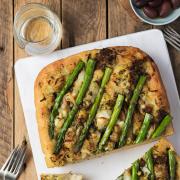Monica Price looks at how changing certain foods can help anxiety
Anxiety is a complicated mental health disorder that requires a multitude of approaches to manage it effectively.
Along with medication and therapy, the foods you eat may help support your mental health, reduce symptoms of anxiety, and promote better brain health.
Overcoming anxiety without medications involves making lifestyle changes, and that includes changing your diet.
There are foods that will help cure anxiety and foods that will contribute to it:
Whole grain foods
Whole grain pasta, rice and bread have several powerful benefits for those with anxiety. Anything whole grain is rich in magnesium – and magnesium deficiency may lead to anxiety. It also contains tryptophan, which becomes serotonin – a calming neurotransmitter. Whole grains create healthy energy while reducing hunger – both important for anxiety.
Seaweed
Seaweed has many of the same benefits as whole grains and is a good alternative to whole grains for those that are gluten sensitive.
Fish
Fish such as salmon, mackerel, sardines, trout and herring are high in Omega 3s. They are incredibly important and are a type of fatty acids that have a strong relationship to cognitive function and mental health.
Many studies have shown that adding fatty fish to your diet can help to improve your anxiety and also depression.
Dark chocolate
Research has found that dark chocolate or cocoa may improve your mood as it is a rich source of polyphenols, especially flavonoids. Chocolate is another source of tryptophan, and dark chocolate is also a good source of magnesium. It’s important to look at the chocolate that contains 70 per cent cacao or more, and only a small amount is needed.
Brazil nuts
Brazil nuts are high in selenium, which is an antioxidant that is important for the cells in our body, and this may improve your mood by reducing inflammation, which is often at heightened levels when someone has a mood disorder such as anxiety.
Other nuts and vegetables, such as mushrooms and soybeans, are excellent sources of selenium as well – and you only need to eat three or four brazil nuts a day to have all that your body needs.
Chamomile
Chamomile is a daisy-like plant most commonly used to make tea with and has long been associated with its calming and relaxing effects. There is also evidence to suggest chamomile may be effective for reducing depression and it is rich in polyphenols – many of which have anti-inflammatory and antioxidant properties.
Foods to avoid
Making sure you are not eating foods that contribute to anxiety can play an important part. Examples of these types of foods could include fried foods, high glycaemic carbohydrates, refined sugars, and alcohol.
A good idea is to write down any food that react or trigger an anxiety attack. If you have a panic attack for example, you may want to avoid coffee, because coffee can increase your heart rate and could be a trigger for an attack.
But if you have more general anxiety then coffee may actually be beneficial. Many find that caffeine, in small quantities, can actually help reduce stress and improve mood.
Monica Price is a qualified nutritional therapist, writer and broadcaster. She is the go-to expert for health and wellbeing on national television and radio stations across the UK, monica-price.co.uk


























